Since the beginning of time, there have been nerds. And some years ago, those nerds finally began to feel joy. And thus it has become a tradition here at Tor.com to celebrate nerdy joy, in the face of tumultuous times, political upheaval, and the devils of the void. In this list you will find celebrations of Star Trek, odes to David Bowie, multiple dance-offs, and a surprising number of gay pirates.
Join us in repudiating the void, nerds. Tell us about your joy in the comments.
Note: some spoilers ahead, so proceed with caution!
The Opening Credits of Strange New Worlds
There is too much I want to praise about Strange New Worlds, from its aesthetic to its flawless cast to its determination to re-contextualize and even retcon things about the Original Series that don’t work in our current cultural landscape. But that would take me a long time to get through, and the easiest way to put across how the show makes me feel is this: Every time I watch the opening credits, I burst into tears. (I’m serious. Every single time.)
There’s the Enterprise, powering up light by light, hurtling through the gorgeous technicolor brilliance of space, with an acid green gaseous cloud here and there to wink at its ‘60s predecessor. The theme nods to the original by Alexander Courage just enough, but still does its own thing, intrepid and buoyant and full of wonder. The ship is stunning—as Captain Kirk will later say “She’s a beautiful lady, and we love her.” These credits remind me of what it felt like to watch Star Trek as a tiny child, mesmerized by the vastness of the universe, and grateful to have so many Starfleet pals to lead me through that journey.
—Emmet
Alix Harrow’s Fractured Fables Series
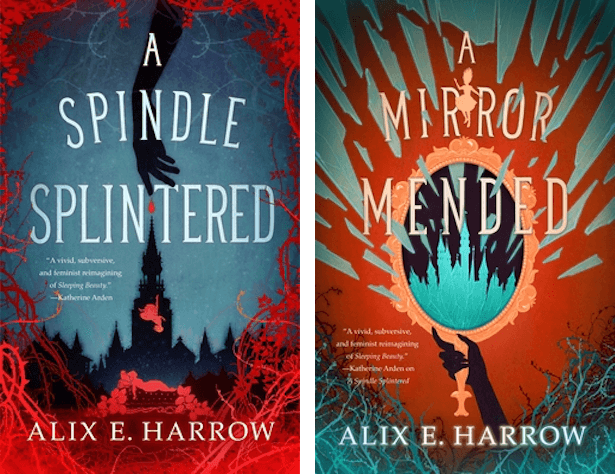
My three main TV/film highlights for the year were Defiant Jazz/The Music Dance Experience from Severance, everything about the Pool Scene from Weird, and the general wonderfulness of Reservation Dogs (which I also raved about last year, so it’s definitely Molly’s turn :) So, I’ll just enthusiastically second all of those things and mention how much I’ve been enjoying Alix Harrow’s Fractured Fables series.This year I listened to both A Spindle Splintered and A Mirror Mended (I do almost all of my reading for pleasure via audiobooks, and have for the last few years. Can’t get enough audiobooks!), and instantly wished I could spend more time in this world. Zinnia’s sarcasm and sense of humor and her relationship with her best friend Charm are delightful, but it’s the blending of perfect pop culture references and scholarly insights into the structure and history of folklore that really warm the cockles of my nerdy heart. I found these novellas to be funny, comforting, and alarmingly habit-forming–I need more of these stories to exist as soon as possible, please.
—Bridget
The Pool Scene in Weird
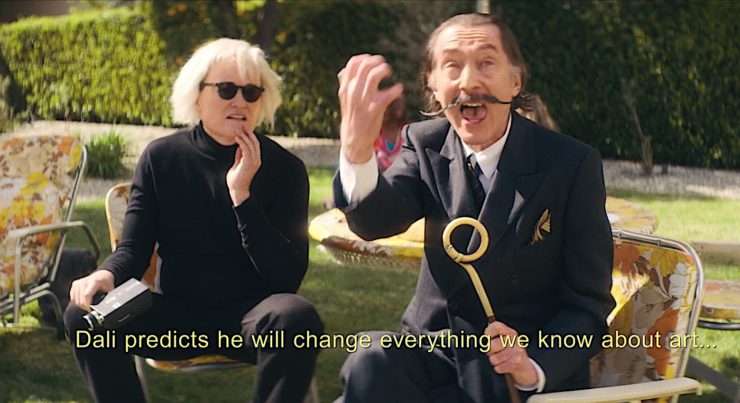
I want to assure everyone that when I said Weird is humanity’s greatest achievement, that was not hyperbole. And the best part of Weird, our greatest achievement, is The Pool Scene. A note-perfect parody of the pool scene in Boogie Nights (a thing I actually didn’t catch the first time, since I haven’t seen Boogie Nights since its first theatrical run) it doesn’t even just coast on the parody, or the cameos, though it totally could. Instead, the scene works perfectly as a turning point moment in the film’s arc, and everyone sells the hell out of it.
But as long as you’re here, let’s talk about those cameos: Paul F. Tompkins as Gallagher? Emo Phillips as Salvador Dali? Jorma Taccone as Pee-Wee Herman? David Dastmalchian as John Deacon, you know, the bassist from Queen??? Conan fucking O’Brien as Andy Warhol??? What’s fun about that is that once I got over my shock at the casting, he did a great job? I’m, well, obsessed with Andy Warhol, and after thinking about it for a while I think Conan’s take might be better than Bowie’s in Basquiat? Is that a thing I can even think, let alone commit to in print?
I’ll need to watch both movies again at some point, but I’m predicting that if anyone gives Conan a full-length Warhol biopic we’ll have a cinematic classic on our hands.
—Leah
“Defiant Jazz”
Severance offers many joys, one of which was the slow burn that was its audience waking up to its incredible promise. At first, it felt like no one was watching; by the end, who wasn’t? (If you weren’t, you should.) And in this perfect season of unnerving weirdness, the Music Dance Experience stands out: A bit of forced office fun that has incredibly ominous overtones, beautiful layers, and unforgettable dance moves. And it’s far from the strangest thing that happens.
—Molly
Love me some Defiant Jazz!
—Vanessa
The L Word: Generation Q Doing “Pony”
Where: A construction site that will become a second lesbian bar. Who: Shane and Finley, a.k.a. the soft butches from the original and reboot series. What: Sliding across the floor gyrating to Ginuwine’s “Pony” in an homage to Channing Tatum in Magic Mike XXL. Gen Q still doesn’t know entirely what kind of show it wants to be, but this felt very in the spirit of the original L Word getting its audience.
—Natalie
The Weeknd’s Dawn FM
I listened to this sucker on a loop for like a month. I’m including it here because technically it’s a concept album about a radio station in Purgatory…I think. Which makes it part of a great fantastical tradition! Is the Weeknd the Dante of the 21st Century? Is Jim Carrey his Virgil? Will the next album be about Paradiso? And what would Paradiso look like through the lens of retro ‘80s synth pop?
—Leah
Molly Templeton’s Mark As Read Column
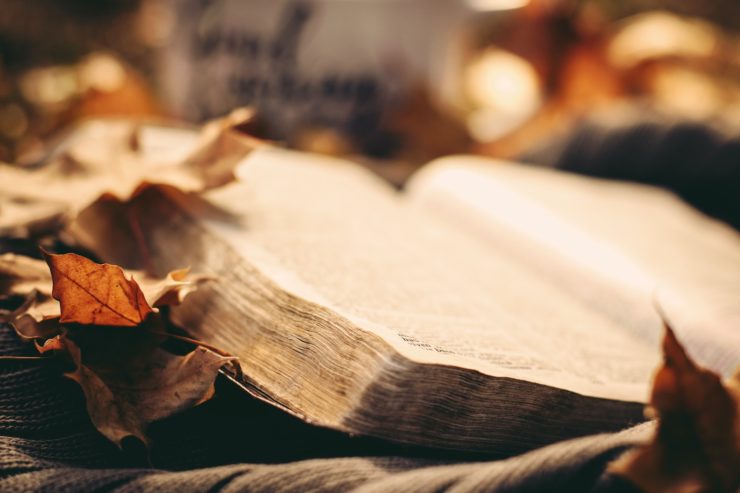
I am a reader who loves the act and art of reading. I love thinking about stories both in the context of my life and what they mean to me, as well as what they mean to our culture and society as a whole. I believe in reading as a simple pleasure, but also that some of the best experiences come from being an active reader—one that keeps their mind open, that is aware of what they bring emotionally and politically when they take a story into their mind, and that thinks about books from a holistic perspective. Molly Templeton’s column Mark As Read has encompassed these ideas and so much more. Templeton discusses life as a reader, what it means to love books, and how reading and emotions intertwine. Her takes on everything from what makes a Sad Banger, to how to approach your ever-growing TBR, to what it means to be a reader with bad brain days have been so meaningful and beautifully written over this past year that it makes me feel even more connected to the joys (and sometimes frustrations) of reading as a hobby. Molly is a singular, brilliant voice and approaches the subject with such care that I devour each essay even if her opinions differ from my own. I simply can’t wait to see what she covers in 2023!
—Christina
Thor’s Terrible Memorial Back Tattoo
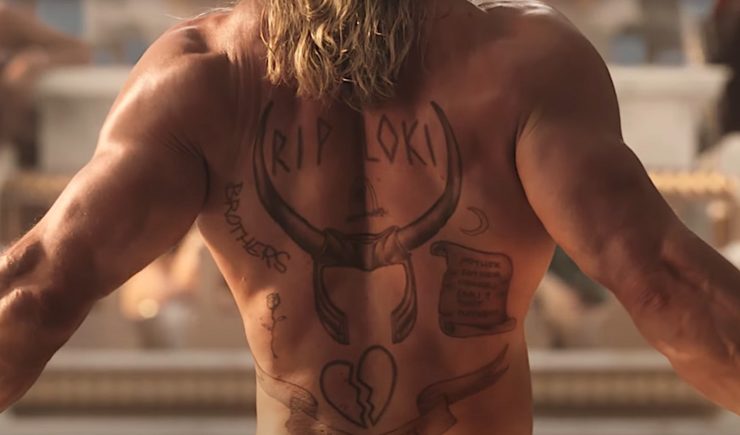
I was a fan of Thor: Love and Thunder, a movie that far too many people were strangely hostile toward. And there were plenty of moments in the film that I could’ve planted here, but I thought I’d pick something very small and very silly to highlight (though I didn’t select the screaming giant goats, which is perhaps remiss).
When Thor is stripped naked by Zeus, a very large, very ugly back tattoo serving as a memorial to all those he has recently lost is revealed to the audience. And while I have no intention of mocking Thor for his grief, everything about this visual is so comically awry that you have to laugh. It’s oh-so easy to imagine Thor, probably very drunk, stumbling into a space tattoo parlour with Mantis and Drax, telling the bored artist in question that this piece will be an ode to those departed, on par with epic Asgardian ballads. Picking out some terrible flash art to personalize after describing Loki’s helm in pain-staking detail (as it will obviously be the focal point), all while trying to remember every name that needs to be on the little scroll of the dead. And then he tells the artist to leave a question mark by Loki’s name. Just in case.
But what truly made this entire scenario, dreamed up in the split-second I stared at this back full of ink was knowing that Loki would be mortified by the artistry (and oh-so secretly touched by the gesture) and will undoubtedly tease Thor for the remainder of their unnaturally long lives once he sees it.
—Emmet
Hercule Poirot’s Mustache Origin Story, Death on the Nile
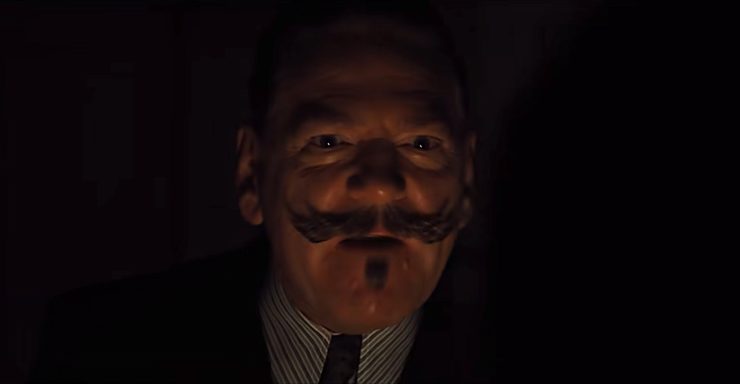
While I prefer Rian Johnson’s modern take on the whodunnit, I’ve enjoyed both of Kenneth Branagh’s Agatha Christie adaptations. And of all the memorable cinematic moments I’ve had this year, nothing topped the moment that I realized Branagh was giving Hercule Poirot’s mustache a traumatic origin story.
Now, to be clear, I haven’t read all of Christie. So if this origin happens in one of the books, let me know in. the comments and I’ll be a little less flabbergasted. But seriously, if not? Scroll away if you haven’t seen it cause you need to go into this cold.
But if you have: In the opening moments of the film, we meet young, clean-shaven Hercule Poirot in the trenches of WWI. We also meet his Capitan, who has a giant, twirly, positively baroque mustache. Hercule suggests a particular tactic for their platoon, and it works—but in the ensuing attack the Capitan is killed, and young Hercule’s face is so scarred he fears his beloved will reject him. So, to be clear, you’ve sat down to while away a few pandemic hours in a fizzy Christie adaptation, and now you’re watching Hercule Poirot deal with shellshock and survivor’s guilt in real time, while trying to hide his face from his fiancé.
A choice!
But of course Hercule’s beloved reassures him that she’ll love him no matter what, and instead suggests that he grow a mustache to cover the scar. Cool! Mustache origin achieved!
BUT THEN SHE GETS BLOWN UP, TOO.
As he mourns, he grows The Mustache of All Mustaches, even more elaborate than his beloved Capitan’s, as a memorial to both of them. He spends the rest of his life (at least up to the time of Death on the Nile) grieving them. And having learned that all of that in some genuinely upsetting scenes at the opening of the film, we all get to sit back an enjoy (???) a star-studded, Deco Fabulous murder mystery.
—Leah
“Never more than twelve.”
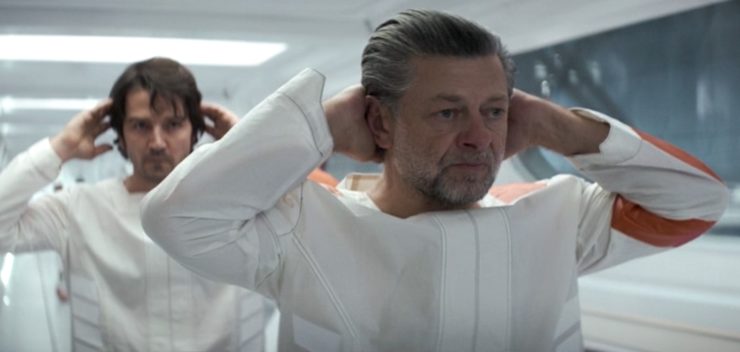
Reader, I gasped. I got goosebumps. I sat frozen on the sofa, gripped by a Star Wars story in a way I had not been for quite some time. The full story of Kino Loy may or may not be told, at this point, but Andy Serkis’s performance in Andor was a standout role in an entire series of standout roles (Fiona Shaw! Denise Gough! Adria Arjona! And holy cats, Diego Luna!). His efforts to work within a fascist system were for always naught, and the minute he truly realized that—when he finally answered the question Cassian just kept asking—Andor snapped into such sharp focus. People with information have to share it. Broken systems need dismantling. And yet, doing the right thing is no guarantee of salvation.
—Molly
Our Flag Means Death in General
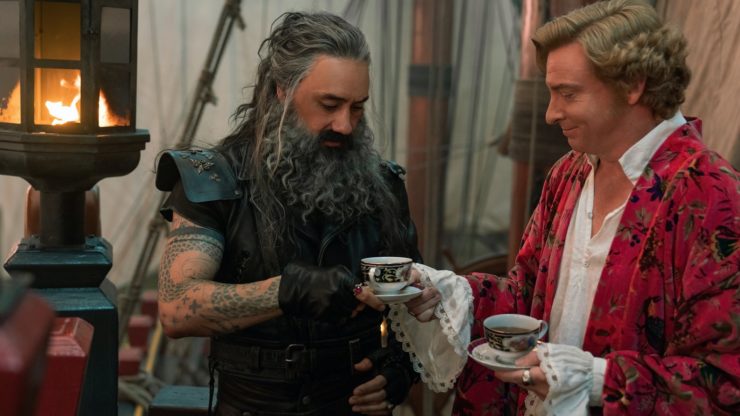
The show that launched a thousand thinkpieces, and a couple ships as well. Is there anything left for me to even say about this? (I mean, yeah, just wait for S2.) This show is full of joy and hope and queerness and Taika Waititi’s EYES and Rhys Darby’s everything and a ridiculously stacked cast and Leslie Jones’ nose jar and probably the best soundtrack of any TV show in history. Waiting for renewal news united the fandom, every Pride celebration was awash in oranges (you’d be forgiven for thinking they were the only fruit for a few months) and now we all just get to coast for another few months before we learn that of COURSE Lucius is OK.
Right?
HE’S OK, RIGHT?
—Leah
Mary Bonnet in Particular
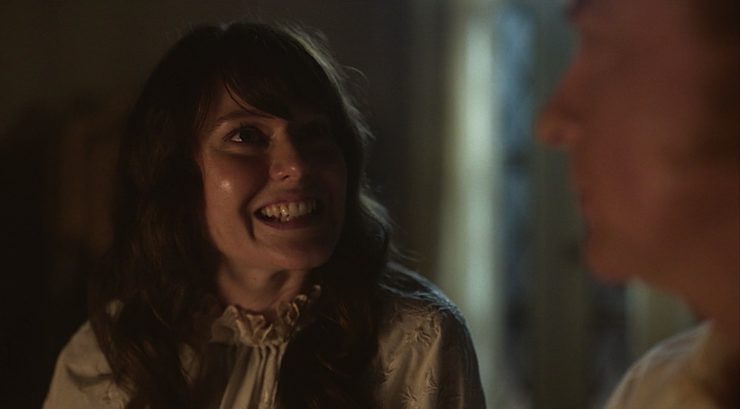
As Maya Gittelman wrote, “It would’ve been so easy to make Mary Bonnet a flat antagonist.” And I have seen enough stories about men finding themselves that I was fully primed to expect nothing more from Our Flag Means Death. Possibly less.
But what it gave us was so much more. Mary isn’t flat, and she isn’t a punchline. She is the architect of her own happiness. She wasn’t any more content with her marriage to Stede than he was, and like him, she took matters into her own hands. When he returns, it’s something neither of them wants—and so, together, they solve the problem, creating a solution that, for the first time, makes them both happy. I love almost everything about this show, especially Lucius. In the end, though, I loved being surprised by Mary’s story maybe best of all.
—Molly
Umbrella Academy‘s Wedding Prep
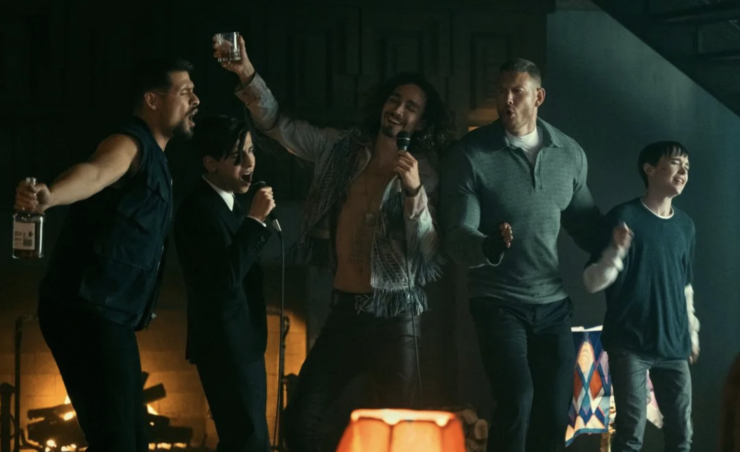
One of my biggest complaints about television and film series is the lack of… hanging out. If I enjoy characters, I want to watch them spend time together, doing hideously mundane peopley things. It’s not everyone’s cuppa, but it’s definitely mine. Leave the plot alone for a bit; it’ll keep.
So imagine my genuine surprise when The Umbrella Academy’s “Wedding at the End of the World” proceeded to be exactly that. An entire episode devoted to the preparation and execution of Luther and Sloane’s wedding, complete with karaoke bachelor party, awkward dancing, and drunken cuddle piles on the patio. There were machinations happening somewhere in the background, sure, but they were largely irrelevant. Most of this episode was just about the Hargreeves family spending time together, at increasing levels of belligerent inebriation. Perfection.
—Emmet
And Umbrella Academy’s Dance Moves
When the Umbrella Academy storm their childhood home, which in this alternate reality now belongs to the Sparrow Academy, they gear up for a big showdown… and then the familiar foot-tapping twang starts up instead. The “Footloose” fight-sequence-turned-dance-off turned out to be a fever dream for us all, but it was the most delightful way to bond Reginald Hargreeves’ idiosyncratic children before they tear each other to shreds.
—Natalie
I’ve been waiting all year to talk about this—It is simply one of the best moments ever put on television. The Umbrella Academy’s music cues have always been next level (who can forget the Backstreet Boys moment from season 2), and we’ve got many family dance scenes, but this one tops them all. In this scene, the Umbrellas and the Sparrows face off in an aggressive dance battle turned joyful dance party—all because Diego is hit by some serious spit from The Sparrow Academy’s Jayme. Not only does this solidify Diego’s hot dumbass status (bless the knife boy who dreams about big musical numbers), but it also highlights all the complex relationships within the series (Diego & Grace, Luther & Sloane, Klaus & Ben!!). Also it’s just so fun and silly. I just love them all so much.
—Christina
Netflix’s How to Build a Sex Room
I am absolutely 100% serious when I say that the eight episodes of How to Build a Sex Room made up eight hours (give or take) of the most enjoyable TV time I spent this year. Melanie Rose, who is rightly described as the Mary Poppins of sex rooms, introduces us to couples who have more available space in their homes than I can easily imagine—and then, in a manner than is always kind and never salacious, helps them figure out what they need, and what they are willing to try, in search of more connection and, yes, more sex. I don’t quite know how to put into words how sweet this show is. Never saccharine, never cloying, but totally open and invested in her clients’ happiness, Rose opens a lot of doors to those she works with—and maybe to viewers as well.
—Molly
Morpheus and Hob
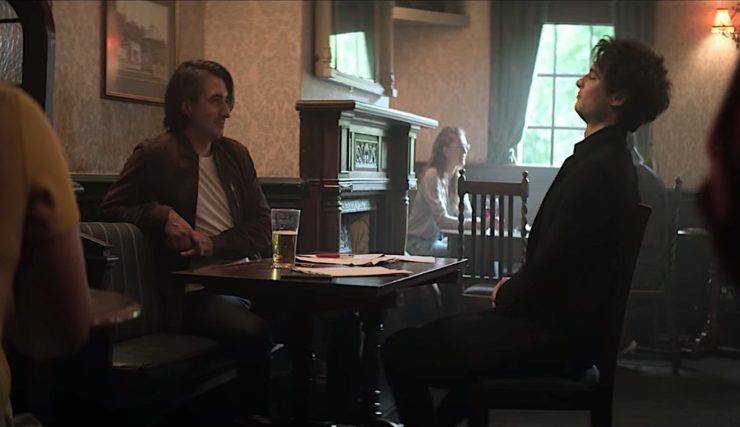
There is a lot to love about Netflix’s adaptation of The Sandman, and I’ve already written about some of it. But here I’ll confine myself to muppet-flailing about Tom Sturridge and Ferdinand Kingsley playing the slow-burn friendship of Prince of Story Morpheus and regular-human-turned-immortal Hob Gadling. Do I hope for the relationship to burn into something more than friendship? Yes, yes I do. But even if it doesn’t, their bond is a great adaptation of one of the best storylines of the original comic.
—Leah
The Number of Times I Said “That’s Gay” and Then It Actually Was, For a Change
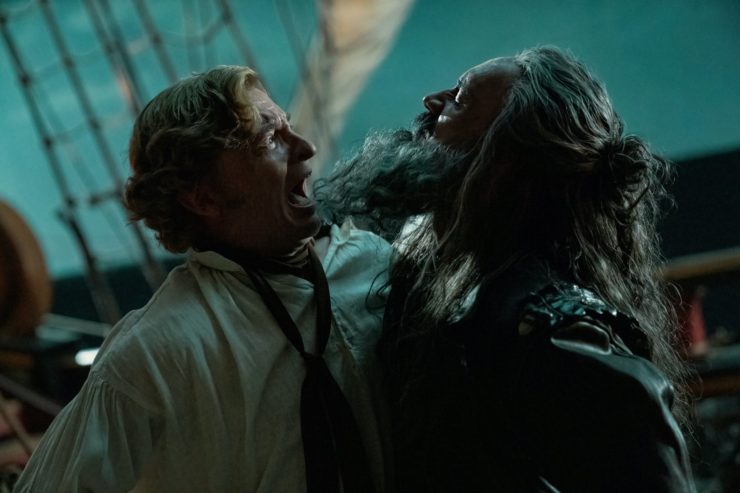
The difficulty with being a queer person consuming media is that you often catch moments that read as undeniably queer, only to have them skirted, forgotten, or seemingly trampled later on. And sometimes it’s down to queer-baiting, but sometimes it isn’t, and that somehow hurts even more. More things should be gay, and they aren’t, and it’s just plumb disappointing to me.
This year marked a tidal shift in that pattern. After a few years of watching Yaz stare longingly at the Doctor, Dan finally called her out in the New Year special, and she admitted to her crush. Our Flag Means Death seemed so triumphantly queer from the outset, and then unequivocally was. Viktor Hargreeves came out as trans. Q told Picard he loved him, and Jean-Luc embraced him for it. Skein told Cassian Andor that Cinta was already sharing a blanket and I whispered “with Vel, right?” which turned out to be the case. A distinct percentage of the crew on Strange New Worlds is canonically queer, and Sybok has a trans pirate spouse now? While viewing The Dragon Prince, my partner took one look at Claudia’s boyfriend Terry, and said “big trans boy vibes,” only to have it turn out that he was, in fact, a trans boy. We started watching Willow, and every time Kit and Jade showed up, I blurted out “Now kiss!” until they suddenly, miraculously did.
I used to shout THAT’S GAY at the screen feeling like no one heard me. This year, it seemed like everyone did. More of this feeling, please.
—Emmet
The Last Scene of Reservation Dogs’ Third Season
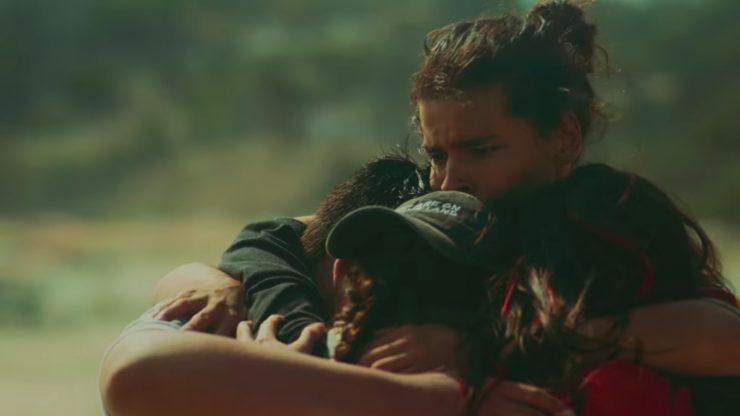
Honestly, we should’ve seen it coming. Reservation Dogs is deeply aware of the 1980s. But this season, when all is said and done, when the gang has gotten where they’re going (not without detours) and stood in the Pacific mourning their lost friend … then, there’s more.
Then there’s the saxophone guy from The Lost Boys.
You think I’m kidding? I’m not kidding. Go watch for yourself, but watch the whole season, because you need to see Bear spend a day on a roof, and everyone dance awkwardly around each other while mourning an elder, and hear Willie Jack say “Can’t be tamed” in that precise way she does, and watch two grown men absolutely butcher “Free Fallin’,” and every other perfect thing that happens in this perfect show. Including Tim Cappello, the saxophone guy from The Lost Boys, whose presence is not a joke or an elbow in the ribs but a meaningful reminder of the friend the characters have lost.
—Molly
Parent Trap Sequel Fanfic
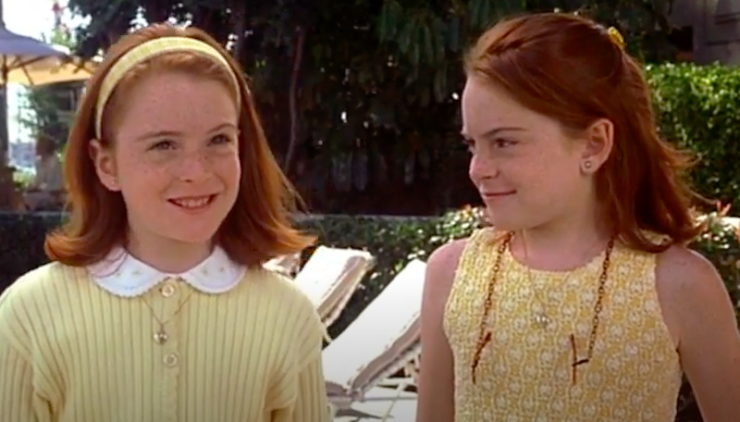
It’s a rule of the Internet that there’s almost always someone else who’s thought of a niche pairing before you. Case in point, I looked up Chessy/Meredith from the Lindsay Lohan Parent Trap and while yes it exists, what I stumbled upon was even better: A sequel fanfic set in 2015, in which Annie and Hallie do another life-swap, Annie gets to be the fuck-up twin, and they’re both gay. I didn’t realize how much I needed it til I was tearing up at the last chapter.
—Natalie
The Unbearable Weight of Massive Talent
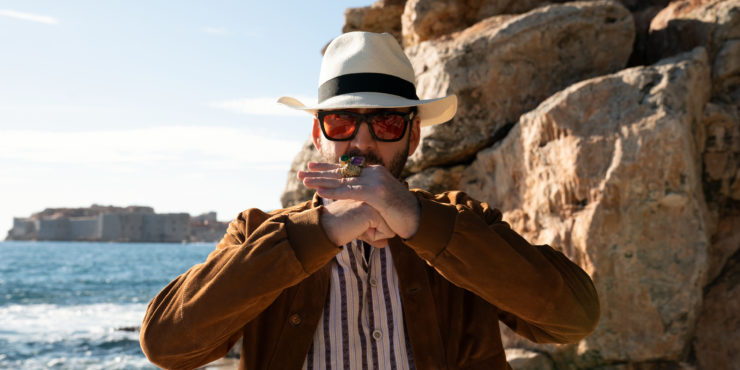
How can you find anything but joy in a film about Nic Cage playing himself, Nic Cage? This movie was silly and fun, and also included a nice bromance between Cage and Pedro Pascal’s character, who is Nic Cage’s Number One Fan and who may or may not be the head of a drug cartel. Is the plot a little dumb? Yes! And I would happily watch it a thousand more times.
—Vanessa
Moonage Daydream
For COVID-avoidance reasons, I try not to go to movie theaters too often anymore—it’s weird to think of films in terms of “is this worth getting seriously ill over?”— but in the case of Moonage Daydream, the answer is yes. While I don’t agree with every choice director Brett Morgen made (WHERE THE FUCK ARE STATION TO STATION AND HEATHEN) he created an extraordinary quasi-biography from interview clips and performances, some of which are very hard to find, and I left the film somehow loving David Bowie even more than I already did.
—Leah
Two Rocks in Everything Everywhere All At Once
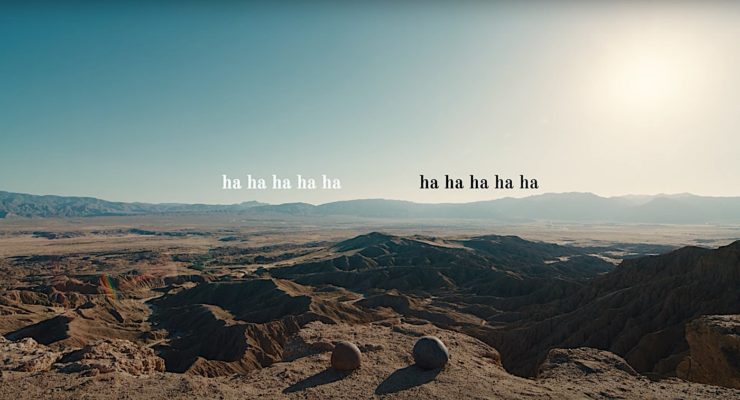
Did anyone expect the rocks to make them cry? I certainly did not. But then, who could’ve expected half the inventive, madcap things the Daniels put on the screen in Everything Everywhere All At Once? I literally shrieked at one point. (It was the trophies.) And I still want that sweater Michelle Yeoh wears, the one that says PUNK across the back.
—Molly
SAME.
—Emmet
<StarMagicJacksonJr>I don’t know…googley-eyed rocks?</StarMagicJacksonJr>
Just Everything in Jodie Whitaker’s Final Doctor Who Episode
I’ve already gone on at length about how much I enjoyed this final bow for Thirteen. The Master was up to his usual bullshit, I got to see Tegan and Ace again, they got to say goodbye to their Doctors for real this time (via holographic interface), Yaz carried the wounded Doctor in her arms like an action hero, and Jodie Whitaker sparkled throughout. Then she gave the most uplifting regeneration pep talk the show has ever seen by the longshot and… well, you remember who appeared. Can’t wait for the 60th anniversary specials.
—Emmet
The Train Crash in The Fabelmans
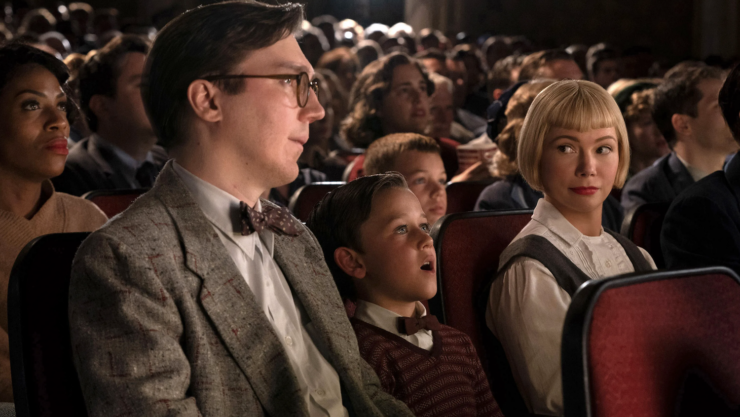
When little Sammy Fabelman’s parents take him to see his first movie, The Greatest Show on Earth, he’s transfixed by a pivotal train crash scene. He’s too young to understand why, but the violence of the sequence itself, combined with a man’s doomed attempt to stop the crash, lodge themselves in his brain and refuse to let go. So he asks for a train set for Hanukkah—not to set the train up and play with it, but to crash it. Repeatedly. While he films said crashes with his dad’s small home movie camera.
Of course this scene is meant to show us that Steven Spielberg knew how to set up a great action shot when most of us were still learning how to tie our shoes. But why the train crash lands on my list is because it’s so uniquely, gleefully Jewish. The individual train cars are gifts for each night of Hanukkah; he unwraps them after his sisters light the menorah. And when he stages his crash, rather than a circus train full of animals, as in the film, he uses his Noah’s Ark toy set! Over and over, the train barrels down the tracks, Noah waves his staff and tries to warn the conductor, the Ark is decimated, and perfectly matched pairs of animals go flying. It’s a funny, joyful way to show that Steven Spielberg’s love of film and his Jewish heritage are inextricably bound together.
—Leah
A Good Old-Fashioned Marathon
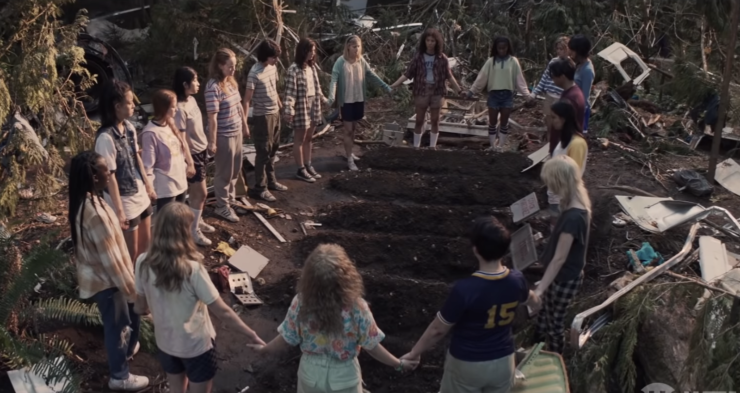
Last winter was my first few weeks postpartum, taking the night shift from 2am-8am. What got me through those sleep-deprived nights was the excitement of a new episode of TV to watch. By the time my son was sleeping through the night, I’d binged Succession (BOAR ON THE FLOOR! brought me nerdy joy, as did all of the parody YouTubes and TikToks), Euphoria (the play within the show!), and Yellowjackets.
—Natalie
The Scene in RRR Where Tigers and Lions Fight the Evil Colonists
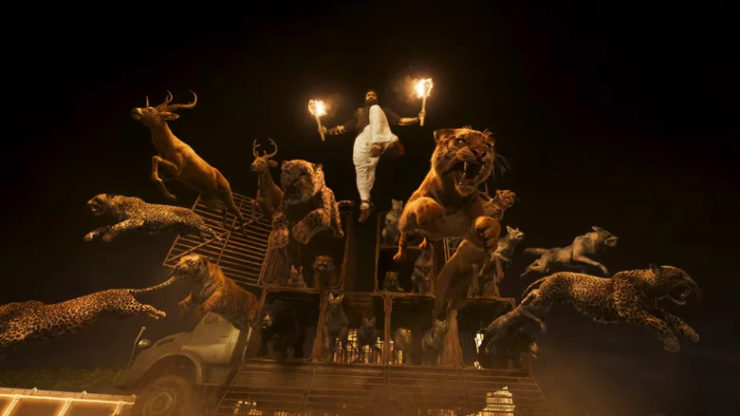
RRR is a three-hour Bollywood masterpiece that is truly epic. The story is also around a bromance between two revolutionaries in 1920s India who fight against the horrors wrought by the British Empire. It includes many, many epic fight scenes (as well as a few great dance numbers), but the one that really stuck with me is toward the end of the film when the revolutionaries unleash a barrage of wild animals—we’re talking tigers, lions, leopards, and reindeer here—against the British oppressors. Watch and enjoy, and if you’re worried about the health of the animals involved, fear not: they’re all CGI.
— Vanessa
Viktor’s Transition on The Umbrella Academy
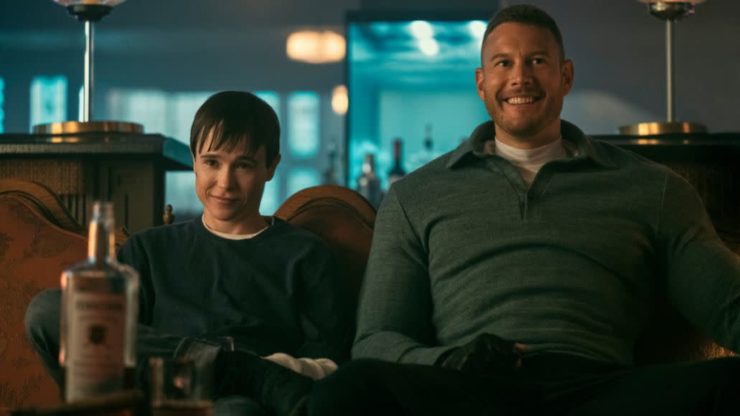
I never really had any doubt that TUA would handle Elliot Page’s identity with care—it was just a matter of how. Because it was entirely possible that Elliot would agree to wear a wig and continue being Vanya for the sake of the show, it was possible they’d make it part of the plot somehow, who knows. But given how they handled both race & queerness in season 2, I was confident that Elliot’s transition was in safe hands. In season 3 we were introduced to Viktor in a subtle yet affirming way. He announces a new name, and his brothers accept him without question. There is an (presumably deeper) offscreen conversation with Allison, who then calls Viktor her “tiny badass brother”. And it’s exactly the kind of thing I wanted to see: not a big deal, not world-stopping, yet not swept under the rug either—Viktor is just Viktor, and everyone moves on. This is encapsulated by my favorite exchange of the season:
Diego: Luther wants to throw you a big stupid party so that you can feel loved. Do you feel loved?
Viktor: Yeah, I do.
Diego: Good. You are. Can we go back to saving the world now?
—Christina
Reading for Fun
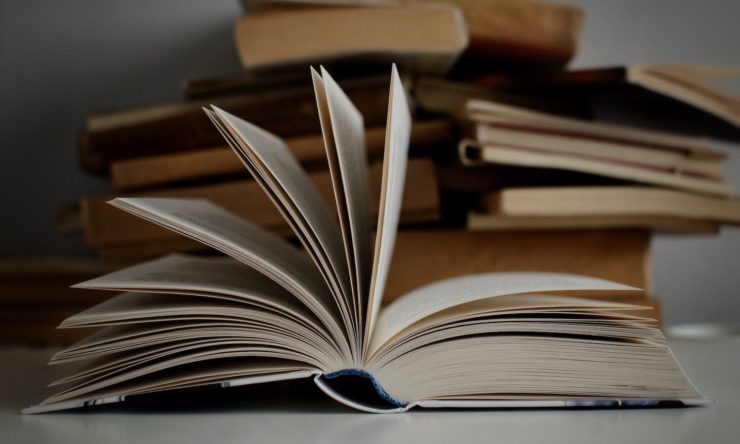
Ever since I stopped reviewing books and started reading just for pleasure again, I’ve been on a rereading kick, which is so different from trying to keep up with new releases that I somehow still feel guilty when I get to pull an old favorite from the shelves and read it without taking notes. This year, my main source of nerdy joy was rereading—more specifically, rereading (or catching up with) entire series.
I’d read the first 15 books in C.J. Cherryh’s long-running Foreigner series as they were released and then lost track; this year, I reread them and then read the six additional novels that have been published since. I read them back to back, all 21 in a row, which was a wonderfully immersive experience, although towards the end I started worrying whether my brain would still be able to process anything but Cherryh’s distinctive prose.
I lost track of Robin Hobb’s Realm of the Elderlings series at some point too, so I reread the first nine novels—in other words, the first three trilogies—back to back. I’m currently trying to decide if I can skip the four Rain Wilds books to get back to Fitz and the Fool in the final trilogy because I clearly haven’t cried enough yet.
Marko Kloos published the eighth novel in his Frontlines series this year, so I reread the previous seven. They’re such quick, entertaining reads that it almost felt like binge-watching eight episodes of a solid, action-packed TV show. I reread the first two novels in Jo Walton’s Thessaly trilogy so I could finally get to the final one, which was wonderful. Short but sweet, I picked up Tade Thompson’s first two Molly Southbourne novellas again to get ready for the third and final one. Using them sort of like palate cleansers, I also reread almost everything Neal Stephenson has written in between all the series and trilogies.
Listen, times are hard, and escapism works. There was nothing more relaxing for me in 2022 than disappearing into some familiar fictional universes for a while.
—Stefan
Naomi’s final speech on The Expanse
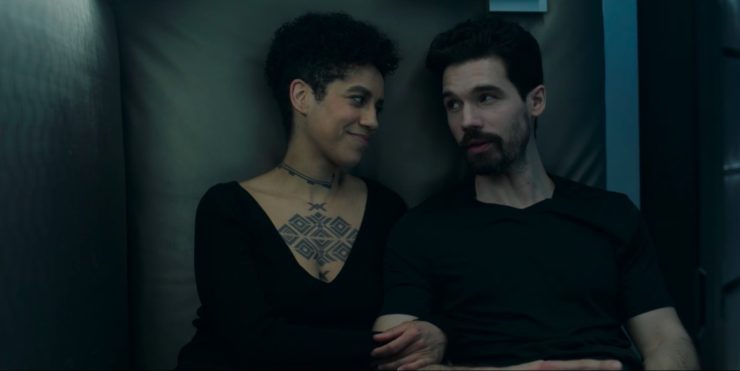
Yes, I put The Expanse on this list last year; no, I won’t apologize for doing it again. The frustratingly truncated final season may have been short on episode, but it was long on all the things that made this one of the finest SF adaptations ever: complex character work, compelling action, and a plot that shows people in all our fallible, failing, optimistic glory. In the end, it’s Naomi Nagata—who has made the hardest choices of anyone on this show—who says what the whole series has been saying. “You followed your conscience in the hope that others would follow theirs. You didn’t do it for a reward or a pat on the head. The universe never tells us if we did right or wrong. It’s more important to try to help people than to know that you did.”
—Molly
Q Loves Jean-Luc Picard, Y’all
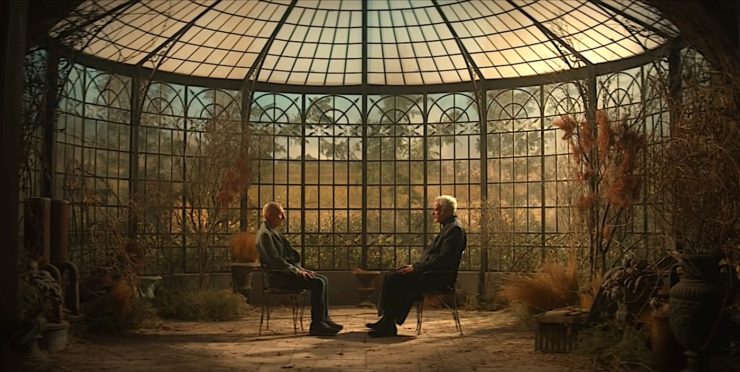
Season two of Picard had plenty of ups and downs, but from the beginning, I told anyone in earshot that the only thing that I demanded was “a season where Q finally tells Picard that he loves him.” I cared about nothing else. Not that the rest of the characters on the series aren’t important to me—they are, and dearly so—but I’d been waiting since I was five years old for this meeting. If Q was back, Trek owed me this.
Michael Chabon and John DeLancie have been going through my dream journals, I guess? They could’ve warned me.
The final scene between Q and Picard, where Q finally lays out what this entire season’s mess of a time travel breakfast has been for… I was so stunned that I’m pretty sure I shouted shut the fuck up at the screen several times. And it wasn’t a feature or a facet of the story, but the crux—the entire point of everything we had just watched. Just a Q standing in front of a messy, prim, sanctimonious human because he needs him to know that “even gods have favorites.”
And Jean-Luc is his.
—Emmet










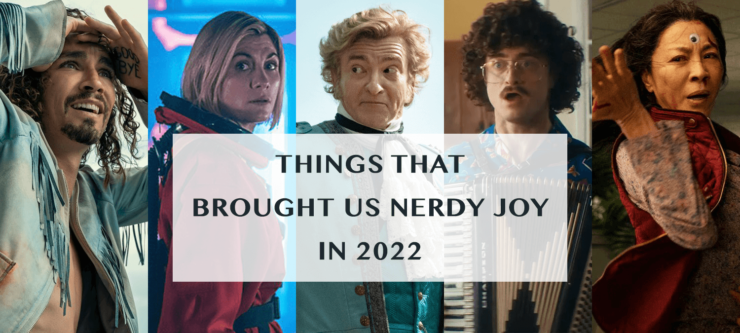
I absolutely second Poirot’s mustache, Sandman and Hob, and all the dance numbers. Who knew about Thor’s back tattoo?! Also, I must watch Umbrella Academy now.
Rob Wilkins’s Pratchett biography, Andor, several specific people (they know who they are) and, once again, everything by Adrian Tchaikovsky.
Only four years after acquiring the PDFs via Bundle of Holding and two years after buying the physical book, I _finally_ read my copy of Mythras TTRPG.
RRR is Tollywood, not Bollywood, and that scene is in the middle of the film, not the end.
What I love about that “No more than twelve” line is how brilliantly it turns the logic of hope, as it has existed throughout the Star Wars franchise, on its head. Hope is important; hope can get you through dark times; but hope can also become your jailer, and the Imperials know this. And so liberation, in this case, became possible not after the prisoners were given hope, but once Kino Loy had finally abandoned it. Just superlative writing throughout that entire series, and honestly, the story we need right now.
My own feelings about LOVE AND THUNDER is that the whole movie is through Korg’s viewpoint, the way he sees events. The stupid tattoos are yet another example. If there’s another Thor movie, those tattoos will not be there.
I like the episodes of What We Do in the Shadows in which they involve other genre craziness, like the vamps attending a “Superb Owl” party at the neighbors, one February Sunday. This season’s cross-genre nerd-out was the reality-teevee home improvement episode, which put the vamp lair under renovation on “Go Flip Yourself”. One of the twin contractor hosts (played by the Sklar brothers, Jason and Randy) is murdered immediately in the opening. And the home “improvements” should have died with him. Kitschy fun for all!
My favourite bit was inadvisably letting my family watch “Everything everywhere” without checking if it was suitable 1st (12 and 15 year old) and them loving it. Best line throughout the film was “what the hell. Did someone just get beaten to death by dlildos???” from the 12 year old. Followed by “how do you know what those are?” from me.
Nice antidote from increasingly bland superhero movies.
Yes there were probably things in there not suitable but hell, I used to steal my mum’s James Herbert books at 12 (and ending up nearly throwing up from reading some parts) so they’ll be fine.
Still pushing Die Hard as our Xmas family movie…
This celebration of Strange New Worlds’s celebration of Enterprise makes me very happy. “She’s a beautiful lady, and we love her” – and long, lingering looks at her from every angle are an intro I will never, ever skip. And yes, I get teary-eyed every time too. I love that show – and I love that ship.
(And in other news, I found a Breyer horse that was identical to one I had and loved as a kid, and lost, and named him Sir Neighsalot, and it makes me both happy and sad every time I see him.)
Do NOT skip the Rain Wild Chronicles! They hit different, piggyback off the Live Ship Traders , and of course, tie into the grand over-arching plot that will wrap up in the Fitz and the Fool trilogy. You’d be doing yourself a disservice not to know all the pieces in play as you read the ending series.
Whatever you decide, I hope you enjoy! Hobb is a master storyteller!
I’ve loved The Parent Trap since I was really little, probably partially because I have an identical twin, so I really want to know about that fanfic. Title? Link?